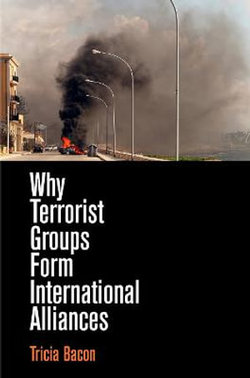Terrorist groups with a shared enemy or ideology have ample reason to work together, even if they are primarily pursuing different causes. Although partnering with another terrorist organization has the potential to bolster operational effectiveness, efficiency, and prestige, international alliances may expose partners to infiltration, security breaches, or additional counterterrorism attention. Alliances between such organizations, which are suspicious and secretive by nature, must also overcome significant barriers to trust--the exposure to risk must be balanced by the promise of increased lethality, resiliency, and longevity.
In Why Terrorist Groups Form International Alliances, Tricia Bacon argues that although it may seem natural for terrorist groups to ally, groups actually face substantial hurdles when attempting to ally and, when alliances do form, they are not evenly distributed across pairs. Instead, she demonstrates that when terrorist groups seek allies to obtain new skills, knowledge, or capacities for resource acquisition and mobilization, only a few groups have the ability to provide needed training, safe haven, infrastructure, or cachet. Consequently, these select few emerge as preferable partners and become hubs around which other groups cluster. According to Bacon, shared enemies and common ideologies do not cause alliances to form but create affinity to bind partners and guide partner selection. Bacon examines partnerships formed by the Popular Front for the Liberation of Palestine, Al-Qaida, and Egyptian jihadist groups, among others, in a series of case studies spanning the dawn of international terrorism in the 1960s to the present. Why Terrorist Groups Form International Alliances advances our understanding of the motivations of terrorist alliances and offers insights useful to counterterrorism efforts to disrupt these dangerous relationships.



Share This Book: